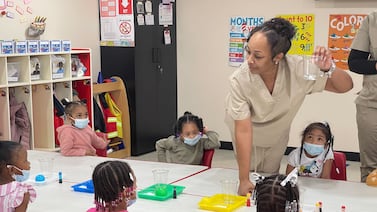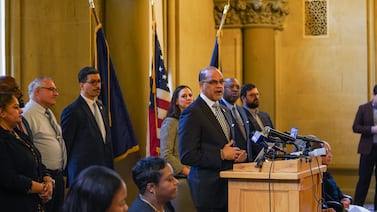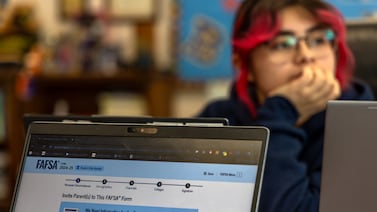New Jersey Gov. Phil Murphy has proposed a $53.1 billion state spending plan for 2024 that includes hefty investments in education, such as expanding the universal pre-K program, increasing school aid for underfunded districts, and new funding for teacher retention efforts.
The boost in funding to public school education and other key areas, including healthcare and the state pension system, would come without raising taxes or increasing New Jersey Transit fare hikes, Murphy said Tuesday in his budget address before a joint session of the state legislature in Trenton. The presentation was also streamed live on the governor’s office’s YouTube channel.
“Every penny we provide for our students, educators, and schools, isn’t just an investment in the futures of our kids or the future of our community or economy,” Murphy said during his presentation to a room full of legislators, former governors, and other supporters. “It’s also property tax relief that lifts more of the burden off the local shoulders of taxpayers.”
One of Murphy’s top initiatives since he took office in 2018 has been universal access to full-day preschool statewide. In the next fiscal year, which begins July 1, he proposes $109 million in new spending for universal pre-K, which would fully fund programs that started in 2023 and includes $40 million that would go toward expanding programs into new districts or other needs, such as workforce development.
Murphy’s proposal also includes a “historic increase” of $832 million in K-12 school funding formula aid, according to a budget briefing provided by the governor’s office. This will be Murphy’s sixth payment in his seven-year plan to provide adequate state aid to districts that have been underfunded for years, including Newark.
“Making this investment will mean that in our six years of working together, we will have increased overall K-12 support to our schools by more than $2.6 billion — a more than 30% increase,” Murphy said. “This support is also critical not just for keeping our public schools the envy of the nation — and they are — but it will also help districts and educators to continue to turn around the learning loss we know occurred when the pandemic forced our students to move to remote learning.”
The proposed dollar amount of state aid for Newark Public Schools was not immediately provided by the governor’s office on Tuesday. Newark received a $120 million boost in state aid for this fiscal year.
For 2024, Murphy proposes to commit an additional $10 million to go toward high-impact tutoring and professional development, an effort to help local school districts and students with academic recovery, according to the budget briefing.
Last year, the governor created a Task Force to Address Public School Staff Shortages, an issue affecting districts statewide, as part of a push to address vacancies in teaching and non-teaching positions across schools. The task force provided the governor with recommendations, which Murphy included in his proposed budget.
Among those proposals: $10 million in stipends for student teachers, a $5 million waiver to teacher certification fees, $2 million in Culture and Climate Innovation Grants “to improve educator quality of life issues,” $1 million to develop local partnerships for paraprofessional training, a teacher apprenticeship program, and more.
Become a Chalkbeat sponsor
The New Jersey Education Association released a statement in support of Murphy’s budget proposal, while also pushing for more of an investment in teacher retention initiatives.
“This budget also takes some small preliminary steps toward addressing New Jersey’s ongoing educator shortage crisis,” the teachers union said in a statement. “However, much more work remains to be done in this budget cycle to address New Jersey’s devastating educator shortage.”
Another top education-related priority in Murphy’s budget proposal addresses the youth mental health crisis. The proposal for 2024 includes $43 million for the first year of the New Jersey Statewide Student Support Services network, which the administration is nicknaming “NJ4S.” The program will be a “new model for delivering mental health services” to the state’s youth and create 15 regional hubs to support delivery of prevention services in schools, libraries, community centers, and faith-based organizations, according to the budget briefing.
“This budget will allow us to meaningfully take on the mental health crisis, especially among our youth,” Murphy said. “As I work with my colleagues and experts across the nation rising to this challenge, I also want to make New Jersey a model.”
The legislature will now begin debates and negotiations, both public and behind closed doors, on Murphy’s proposed budget, which will go through a series of public hearings before the June 30 deadline for the governor to sign the budget into law.
Catherine Carrera is the bureau chief for Chalkbeat Newark, covering the city’s K-12 schools with a focus on English language learners. Contact Catherine at ccarrera@chalkbeat.org.







